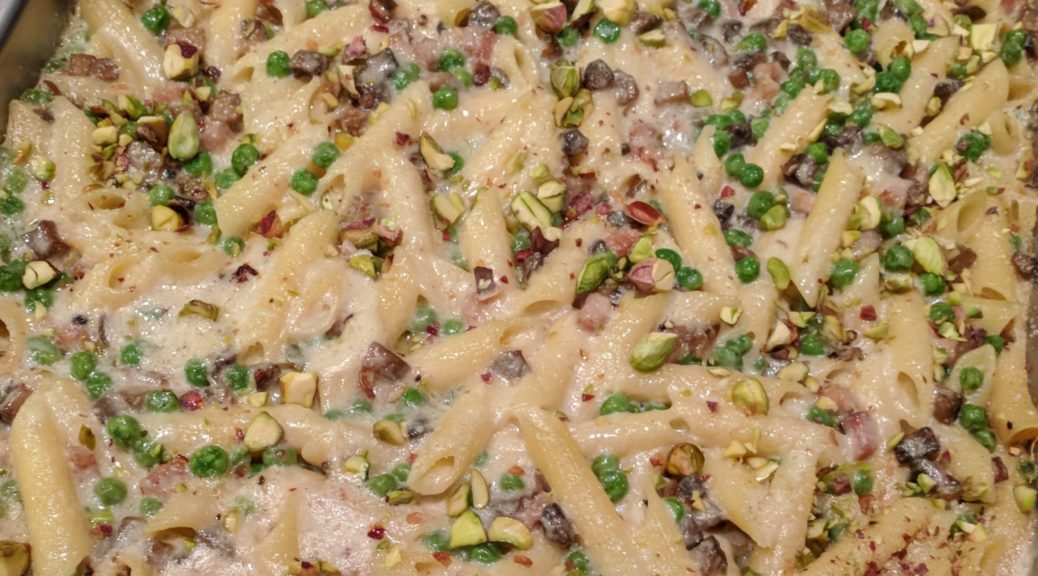May 14, 2018
I apologize!
In my inaugural messages, I clearly stated that I would publish traditional recipes, many (though not all) of them Italian, but with the emphasis on traditional.
I get really stoked by the idea of preserving traditional recipes in written form (even if it’s a bunch of zeroes and ones on a cloud server somewhere)!
I also truly appreciate new and innovative dishes…especially cakes, for some reason. But my very strong preference if I’m going to work on perfecting and publishing a recipe is to focus on traditional recipes. (I’m happy to eat good food of any type, traditional or not, that someone wants to serve me, however.)
Follow us on your social media platform of choice
My editorial calendar for this blog, including what I’ve published and what I currently have planned to publish, numbers 212 recipes. The number keeps growing. Most of these recipes are ones I listed (off the top of my head, so to speak) when I was planning the launch of the blog in late 2016. The list came from simply thinking about my favorite recipes. As I trawl through my recipe archive periodically, looking for recipes for particular events, or even just dinner, I usually come upon at least a few more recipes that get added to the list.
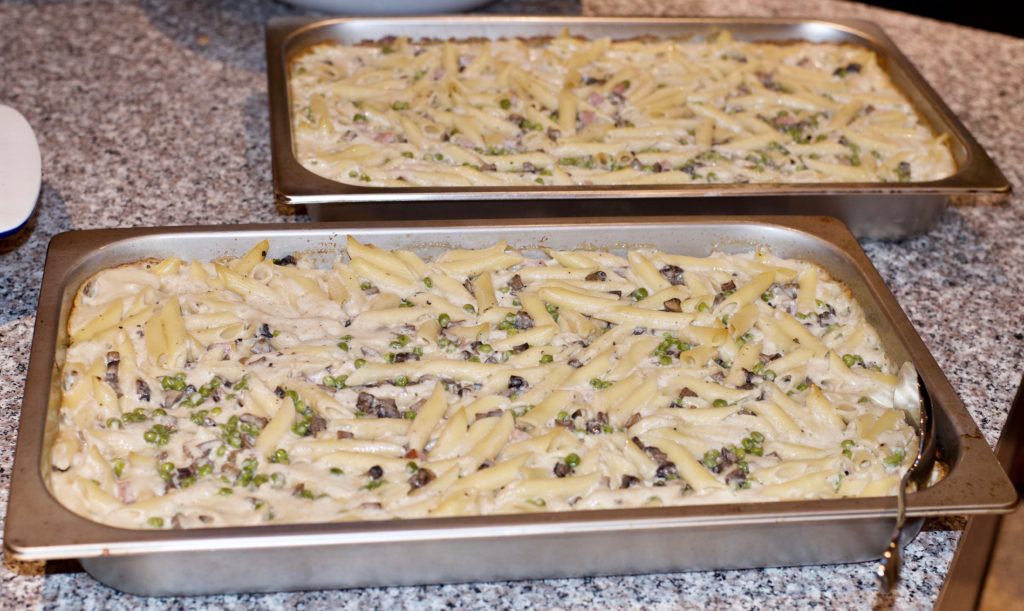
Windows says I have 4133 recipes saved in my recipe directory. That does not count the hundreds of hand-written ones that I’ve not scanned in yet.
But I have to admit, not EVERYTHING I make is traditional. I have this killer salmon recipe that I got from the New York Times that is now a regular on our table. Almost any vegetable recipe by David Tanis is a winner in my book, well really ANY recipe by David Tanis, but he has a way with vegetables. He has many make-ahead-and-heat-up-in-the-oven options that remove a lot of last minute work when putting dinner on the table, whether it be for 2 or 20!
In my defense, these are recipes that I think will become classics in a few decades just as many of the recipes that I started cooking 45 years ago in college have become classics for me. I think if a recipe still tastes good after half a century it can be considered a classic…which is getting pretty close to traditional.
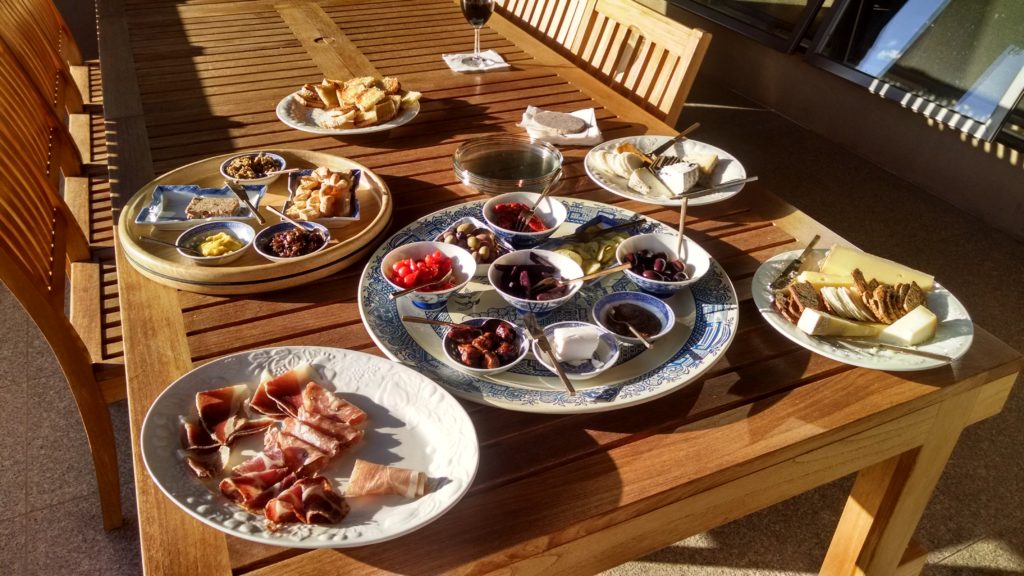
Think about all the things you ate 50 years ago that you don’t make any more, like fried bologna simmered in ketchup! That actually is something that my very traditional mother put on the table in the 1960s! Granted, it was a main course (and I use the term lightly) that could be whipped up in under half an hour after a day’s work. The truth is, I actually liked it at the time.
I differentiate the fried bologna category of foods that I don’t make any more from the fried salami category of foods that I still love but that just have fallen off my rotation. Have you ever had a sandwich of pan-fried salami? If not, give it a try. (Thinly slice the salami. Make a cut from the middle to one edge, like the first cut of a pie, to reduce puckering. Cook in a skillet over medium heat till lightly browned on each side. No oil needed. Pile on bread. Enjoy…dripping fat and all!)
Join our mailing list and you’ll never miss a recipe again!
So why the apologia?
Today’s recipe isn’t traditional. I developed it about four years ago for dinner for a large group of people. It was such a hit, that I kept making it. I even made it last summer for a dinner party for the family from Tuscany! So, while it’s not really traditional (which I take to mean something with a cultural history, something that individuals from a particular culture and location make or made on a regular basis), it has a very traditional FLAVOR.
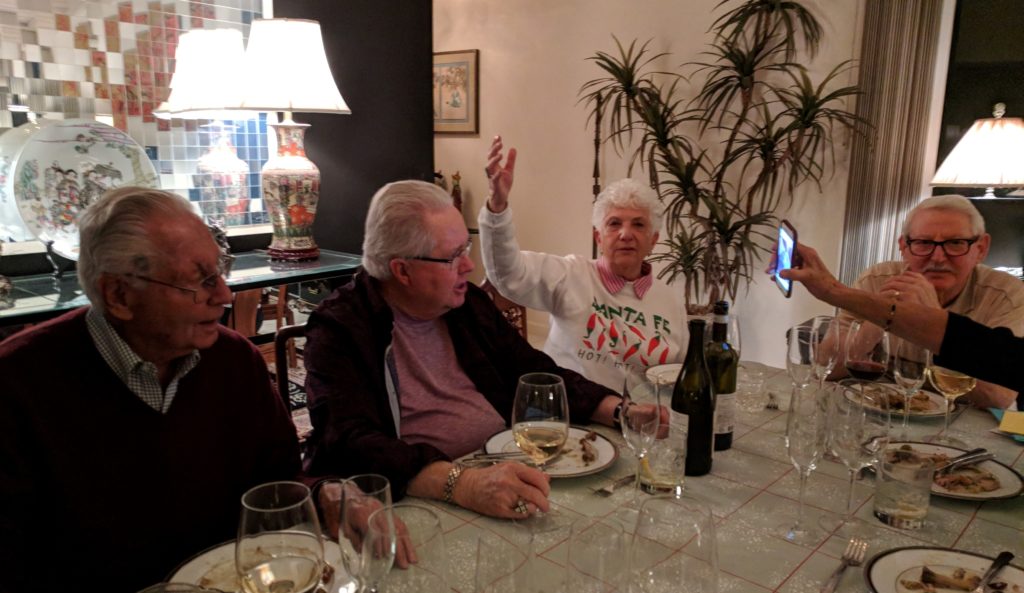
In my mind it’s not a REAL (i.e. traditional) dish because I made it up. On the other hand, the flavor profile makes it fit into an established canon of northern Italian food. Italians would recognize it as Italian food, just not traditional Italian food.
Because it isn’t traditional, I hadn’t planned on publishing it. I got a number of requests for the recipe after I mentioned it in one of my emails and decided that I should reconsider my initial decision. There aren’t many photographs but the steps are not really complicated. I know you can do it without all the usual photos.
Who knows, maybe in another 45 years it’ll become a classic!
Ingredients
Balsamella (White Sauce)
Final Assembly
|
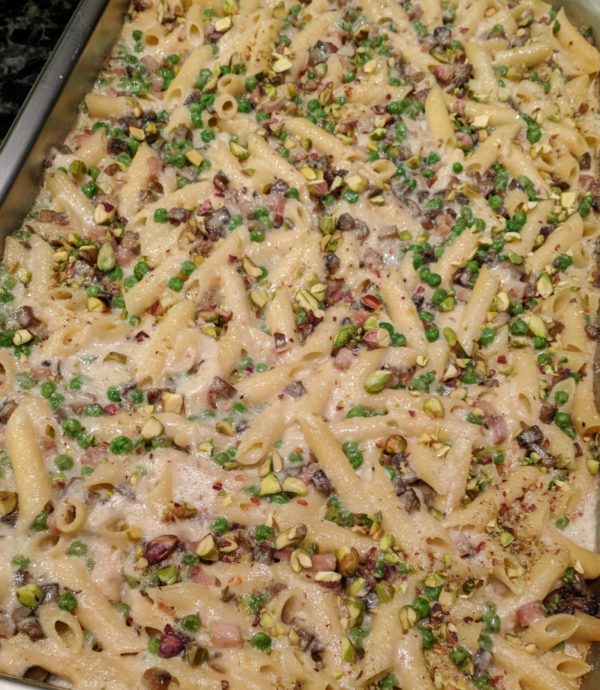
|
- Put the garlic in a single layer in a small oven-proof dish with a tight-fitting lid. Alternatively, put the garlic on a sheet of heavy-duty aluminum foil.
- Sprinkle the garlic with olive oil.
- Put the lid on the dish, or fold up and seal the aluminum foil.
- Roast the garlic at 300°F until soft and golden brown, approximately 45 minutes, stirring occasionally.
- Put the garlic and any olive oil you can scrape out of the dish into a blender jar.
- Add 1 cup of the milk.
- Puree the garlic and milk. Reserve.
- Warm the remaining milk in a heavy-bottomed saucepan.
- Melt the butter in another heavy-bottomed saucepan over medium heat. Stir the flour into the butter.
- Cook for a few minutes on medium heat but do not allow flour to color.
- Stir in the warm milk, one ladleful at a time, incorporating well after each addition to avoid lumps.
- After about half the warm milk has been incorporated, add the pureed garlic mixture.
- Use some of the warm milk to rinse out the blender jar and add it to the pot. Stir well.
- Add the remaining milk to the pot along with the bay leaves, rosemary sprigs, and lemon zest.
- Bring to a boil over medium high heat stirring (nearly) constantly and cook until the sauce reaches the thickness of heavy cream, approximately 5 minutes.
- Strain the white sauce through a fine-mesh sieve.
- If not using the sauce immediately, cover it with plastic wrap, putting the plastic directly on the surface to prevent the formation of a skin, and refrigerate. [If you are going to prepare the casserole in advance, make sure the balsamella is cold before combining with the other ingredients.]
- Put the frozen peas in a large sieve. Rinse with cool water to thaw the peas. Allow the peas to drain and completely thaw while proceeding with the recipe.
- Heat the olive oil in a large sauté pan over high heat.
- When the oil is hot, but not smoking, add the diced mushroom caps. Toss well.
- When the mushrooms have absorbed the oil, add 1 teaspoon of fine salt. Mix well.
- Turn the heat to medium low until the mushrooms begin to sweat.
- Turn the heat to high and continue sautéing until the liquid evaporates.
- Continue to cook until the mushroom pieces are browned in places.
- Season with black pepper. Add ham and cook 2-3 minutes.
- Remove from the heat and reserve.
- Bring a large pot of heavily salted water to a rolling boil. Add the pasta.
- Boil until the pasta is partially cooked. It should still be a little crunchy on the inside.
- If you are going to cook the casserole immediately, drain the pasta but do not rinse. If you are going to assemble the casserole in advance, drain the pasta and chill it in a bowl of ice water. When cold, drain well.
- Combine pasta, peas, mushroom and ham mixture, and balsamella. Mix well.
- Pour into a large buttered casserole. For this quantity, I use a full-size steam-table tray, also called a “hotel pan.”
- Put a sheet of parchment on top then cover the pan tightly with heavy-duty aluminum foil. You can skip the parchment if you are going to cook the casserole immediately. Food should not stay in extended contact with aluminum, hence the parchment paper if the dish is being assembled in advance.
- Either refrigerate or bake at 350°F until bubbly. Baking time will depend on whether the ingredients are hot or previously refrigerated and brought to room temperature, 1 ½ to 2 hours.
- Remove the foil and parchment. Sprinkle the top with Parmesan cheese and nuts.
- Place under the broiler, or on the top rack of an oven heated to 500°F, until the top is golden brown.
- Allow the casserole to rest at least 15 minutes before serving.
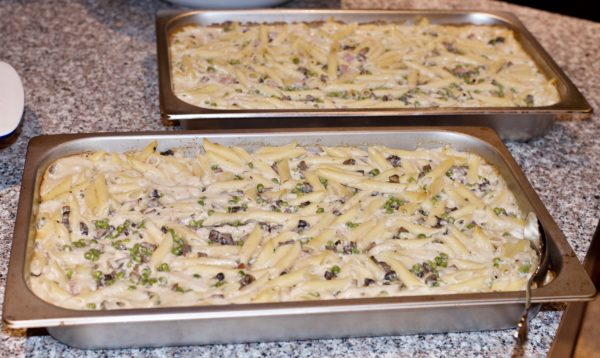
Copyright © 2018 by VillaSentieri.com. All rights reserved.
|
|

